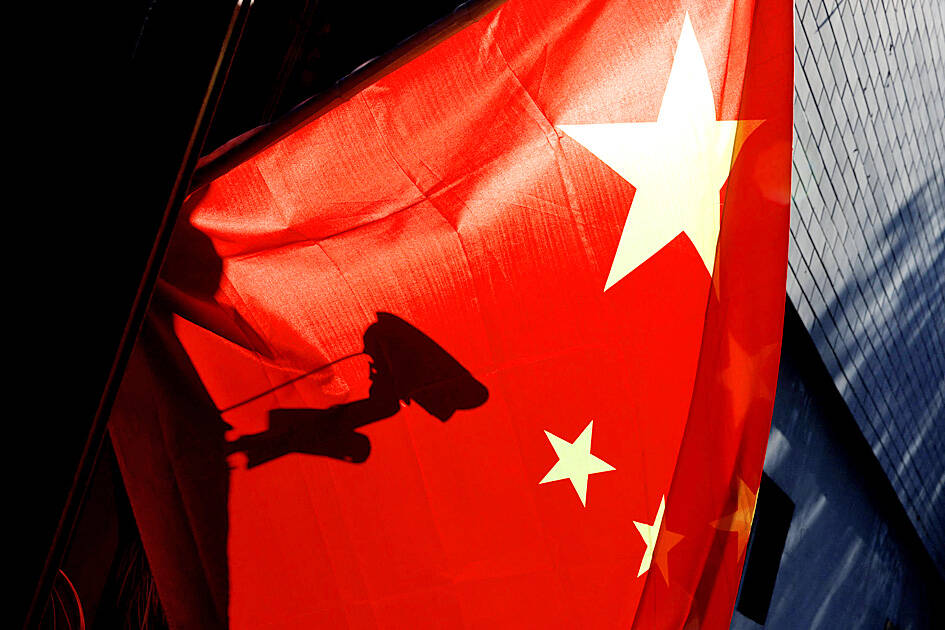The number of Chinese spies prosecuted in Taiwan has grown threefold over a four-year period, the National Security Bureau (NSB) said in a report released yesterday.
In 2021 and 2022, 16 and 10 spies were prosecuted respectively, but that number grew to 64 last year, it said, adding that the Chinese Communist Party (CCP) was working with gangs in Taiwan to develop a network of armed spies.
Spies in Taiwan have on behalf of the CCP used a variety of channels and methods to infiltrate all sectors of the country, and recruited Taiwanese to cooperate in developing organizations and obtaining sensitive information from Taiwan’s government, the report said.

Photo: Reuters
The bureau said it hoped that the report would help Taiwanese to better understand the CCP’s espionage operations in Taiwan.
The majority of people targeted by the CCP for recruitment are current or retired military personnel, it said.
Of the 64 spies prosecuted last year, 15 were retired military personnel, accounting for 23 percent of the total, while 28 were active personnel (43 percent of the total), it said.
Giving an example of how the CCP coerces military personnel, the report cited the case of one-star general Lo Hsien-che (羅賢哲), who was caught in a honey trap scheme while stationed in Thailand and later leaked military secrets to Chinese officials in exchange for payment.
The CCP infiltrates Taiwan through engagement with local gangs, illegal private money lenders, shell companies, religious groups and nonprofit organizations, the report said.
The CCP seeks operatives in Taiwan by building network connections, using financial incentives, coercing people with debt, and infiltrating military, government and civil society organizations, it said, adding that China also tries to interfere with elections in Taiwan.
The NSB said it has found evidence that gangs recruited by the CCP were asked to raise Chinese flags and engage in armed insurrection in the event of an attempted invasion by the Chinese People’s Liberation Army.
The insurrection plans called for trained snipers in Taiwan to attack members of the military and foreign organizations, the report said.
It also called for military personnel to fly helicopters to China to surrender during an invasion and to hand over Taiwan’s defense plans to the CCP ahead of such an invasion, it said.
The CCP pays recruits by transferring money through digital payment services or using cryptocurrencies, making payments hard to trace, the report said.
The NSB has established a mechanism for cooperation across the bureau, military and investigative agencies to address Chinese espionage, it said.
Prosecutions and conviction rates of spies have increased, and last year, investigators cracked a spy ring involving 23 people and sentenced one spy to 20 years of imprisonment, the report said.
The detection of espionage has been helped in the past few years by clues provided by military officers and soldiers, and the public, which showed that public awareness of security issues has greatly increased, it added.

Taiwan is gearing up to celebrate the New Year at events across the country, headlined by the annual countdown and Taipei 101 fireworks display at midnight. Many of the events are to be livesteamed online. See below for lineups and links: Taipei Taipei’s New Year’s Party 2026 is to begin at 7pm and run until 1am, with the theme “Sailing to the Future.” South Korean girl group KARA is headlining the concert at Taipei City Hall Plaza, with additional performances by Amber An (安心亞), Nick Chou (周湯豪), hip-hop trio Nine One One (玖壹壹), Bii (畢書盡), girl group Genblue (幻藍小熊) and more. The festivities are to

Auckland rang in 2026 with a downtown fireworks display launched from New Zealand’s tallest structure, Sky Tower, making it the first major city to greet the new year at a celebration dampened by rain, while crowds in Taipei braved the elements to watch Taipei 101’s display. South Pacific countries are the first to bid farewell to 2025. Clocks struck midnight in Auckland, with a population of 1.7 million, 18 hours before the famous ball was to drop in New York’s Times Square. The five-minute display involved 3,500 fireworks launched from the 240m Sky Tower. Smaller community events were canceled across New Zealand’s

‘IRRESPONSIBLE’: Beijing’s constant disruption of the ‘status quo’ in the Taiwan Strait has damaged peace, stability and security in the Indo-Pacific region, MOFA said The Presidential Office yesterday condemned China’s launch of another military drill around Taiwan, saying such actions are a “unilateral provocation” that destabilizes regional peace and stability. China should immediately stop the irresponsible and provocative actions, Presidential Office spokeswoman Karen Kuo (郭雅慧) said, after the Chinese People’s Liberation Army (PLA) yesterday announced the start of a new round of joint exercises around Taiwan by the army, navy and air force, which it said were approaching “from different directions.” Code-named “Justice Mission 2025,” the exercises would be conducted in the Taiwan Strait and in areas north, southwest, southeast and east of Taiwan

‘SLICING METHOD’: In the event of a blockade, the China Coast Guard would intercept Taiwanese ships while its navy would seek to deter foreign intervention China’s military drills around Taiwan this week signaled potential strategies to cut the nation off from energy supplies and foreign military assistance, a US think tank report said. The Chinese People’s Liberation Army (PLA) conducted what it called “Justice Mission 2025” exercises from Monday to Tuesday in five maritime zones and airspace around Taiwan, calling them a warning to “Taiwanese independence” forces. In a report released on Wednesday, the Institute for the Study of War said the exercises effectively simulated blocking shipping routes to major port cities, including Kaohsiung, Keelung and Hualien. Taiwan would be highly vulnerable under such a blockade, because it